Next week, a NATO summit will take place in The Hague. The international community is focused on security issues, support for Ukraine, and strengthening the Alliance.
One of the main topics on the summit’s agenda is enhancing Europe’s defense capabilities, including the possibility of increasing defense spending to 5% of GDP. Just last week, the Dutch government endorsed NATO’s new defense spending target precisely at 5%.
It is worth noting that after losing the parliamentary majority, the Dutch government continues to operate in a caretaker capacity until a new coalition is formed and a permanent cabinet is approved. Snap parliamentary elections in the Netherlands are scheduled for October 29, 2025.
Ruben Brekelmans has been serving as Dutch Minister of Defense for almost a year. In the very first week after his appointment, Brekelmans visited Ukraine. Since then, he has made three visits, supported dozens of aid projects, fostered strategic security cooperation, and maintained a firm stance on supporting Ukraine.
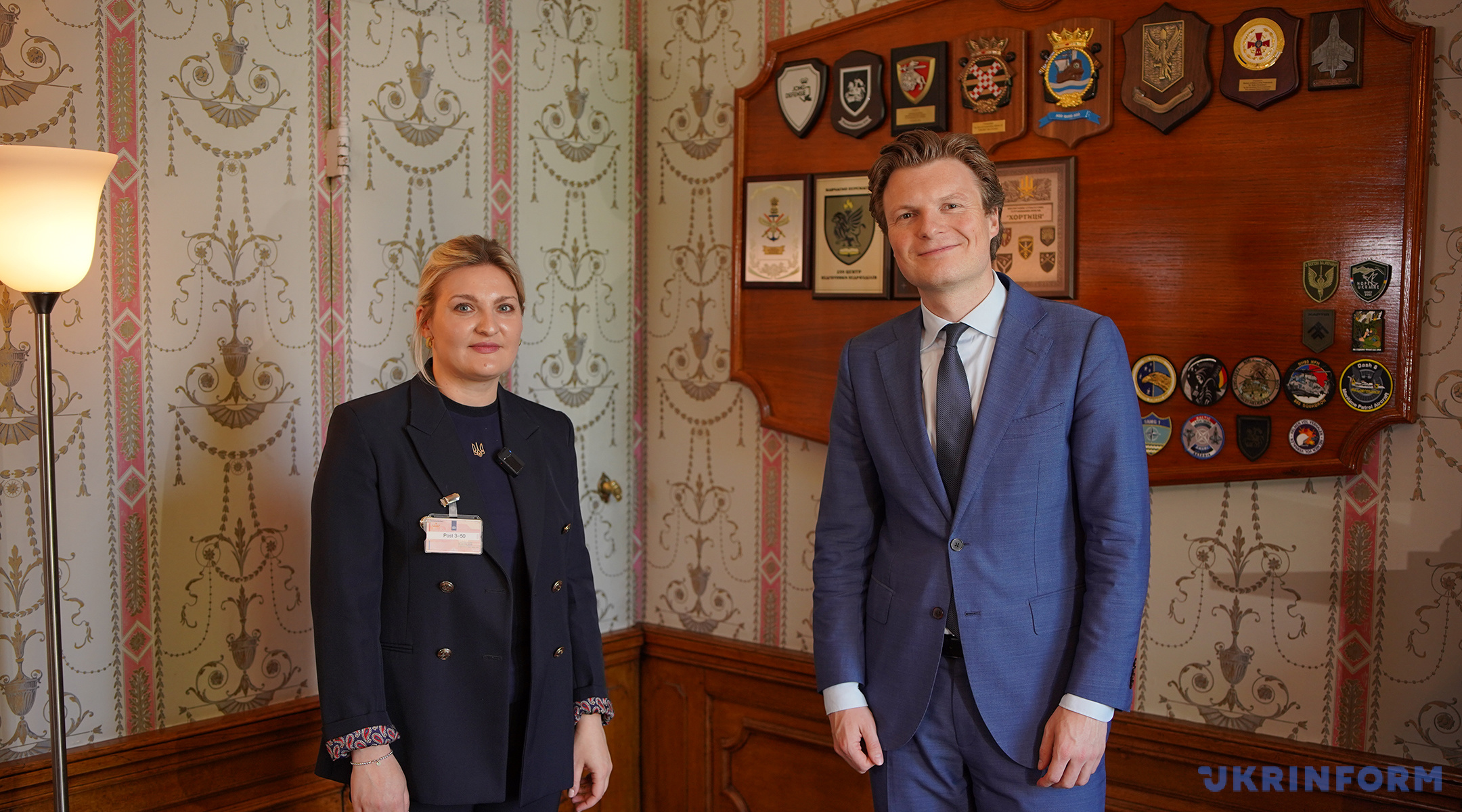
In his office at the Ministry of Defense in The Hague, where Ukrinform was invited for an interview, almost everything reflects Ukraine: patches from Ukrainian brigades, battalions, and other units; shell casings; paintings and books about Ukraine. During the conversation, a T-shirt from Ukraine featuring an F-16, presented by an Ukrinform correspondent, was added to the minister’s collection.
The Netherlands ranks among the leading European countries in terms of military aid to Ukraine. Key elements of this assistance include modern armored vehicles, air defense systems, F-16 fighter jets, as well as the first Patriot missile systems.
Thus, expectations for the summit, military assistance to Ukraine, and the Netherlands’ strategic initiatives were discussed with Ukrinform by Dutch Minister of Defense Ruben Brekelmans.
STRENGTHENING OF RUSSIA’S POSITIONS IN UKRAINE WILL POSE A GREATER THREAT TO NATO AS WELL
- First of all, thank you for taking the time for this interview. It is a great honor to be here. You have a very nice office with so many souvenirs from Ukraine. Which one is the most special to you? Why did you and the Minister of Foreign Affairs go to Ukraine just a few days after the new government was appointed?
- It is a great honor for me to work here. Yes, there are quite a lot of them (souvenirs from Ukraine).
So, our first visit as new ministers — both foreign affairs and myself — abroad was to Ukraine during our first week after our inauguration. I’ve been a minister now for almost a year, and I’ve been to Ukraine three times. Every time I visit Ukraine, I go to both Kyiv and one other place. I’ve been to Odesa, Kharkiv, and Dnipro. And everywhere I go, I quite often receive a very nice gift. It can be something related to the military or a piece of art. They are all special because each piece has a story behind it — often a personal story, which very often is a combination, of course, of suffering, unfortunately, but also of hope, perseverance, and a better future. I think what was most special for me — when I went to Dnipro, I also visited the Commander of the Ukrainian Ground Forces, Major General Mykhailo Drapatyi. They gave me the emblem of their troops there, and for me that was very special because those are, of course, the men and women who fight on the frontline every day. He told me that he has been at war and fighting for 11 years now, every single day, and that currently the fighting is more intense than ever. When he told me this, and also when his men shared their stories with me and gave me their signs, emblems, that was a very special moment for me.
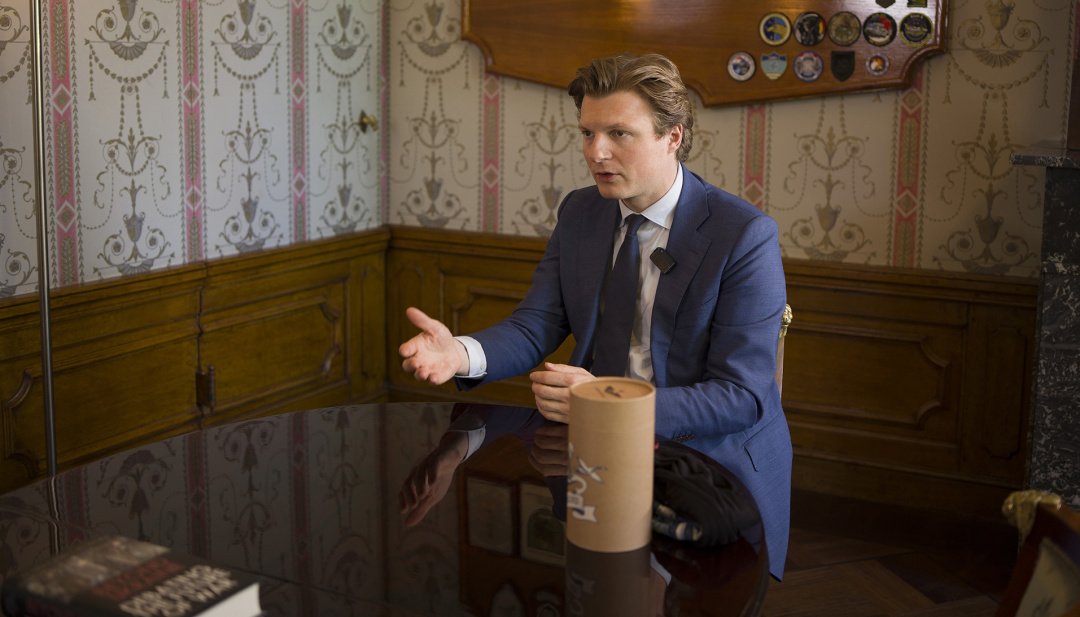
- The NATO summit will take place in The Hague next week. What are your expectations of the summit, and what can Ukraine hope for?
- I think there are three important topics. First, of course, is a new defense investment pledge. It is very likely that NATO will decide on a new goal of 3.5% for core defense and 1.5% for defense-related expenditures, making 5% in total. We argue that support for Ukraine should also be part of this 3.5% core defense because, of course, we see that our security is very much connected and interrelated — if Russia is able to strengthen its position in Ukraine, then it poses a bigger threat to NATO, and vice versa.
Second, the defense industry will be an important topic. It's about stimulating the defense industry in Europe, and of course, that includes Ukraine because there is a lot of potential to invest in Ukraine and its industry, with many opportunities to scale up. So, that will be an important topic.
Third, of course, is our unwavering support for Ukraine. I think quite a few allies will make strong statements, and hopefully, we will also announce some further support packages for Ukraine.
So, those are the three priorities for me, and I think it’s going to be a historic and successful summit.
- NATO Secretary General Mark Rutte stated that Ukraine's path to membership in the Alliance is irreversible, but not in the near future. How do you assess the realism of Ukraine's membership in NATO in the coming years?
- For me, it’s very hard to predict. At the last NATO summit in July, 32 allies agreed on a joint statement saying that the path towards membership for Ukraine is irreversible. I think that is a very strong statement, and I believe we should stick to it. However, how fast this progress can be made depends on a few things.
One is the war that is taking place and how it is evolving — whether there will be a ceasefire or even a peace agreement or not. But, of course, it also depends on how the 32 allies view this. It’s no secret that the current US administration is more critical of this than the previous one. So, for now, I think it is important that, on the one hand, we stick to the conclusion we made last time, and on the other hand, on a very practical level, keep working with the Ukrainian military and Ukrainian institutions to further develop towards NATO standards. If you look at the capability coalitions we have — take, for example, the Air Force coalition, which we are very active in — we delivered the F-16s. But it’s not only a matter of delivering fighter jets; we also help Ukraine develop towards NATO standards. This means ensuring that training, maintenance, doctrines, and operational procedures are interoperable and compatible with NATO standards. So, if in the future the circumstances and political will exist for Ukraine to become a member of NATO, we need to make sure that Ukraine is practically ready. And that’s what we are working on in the meantime.
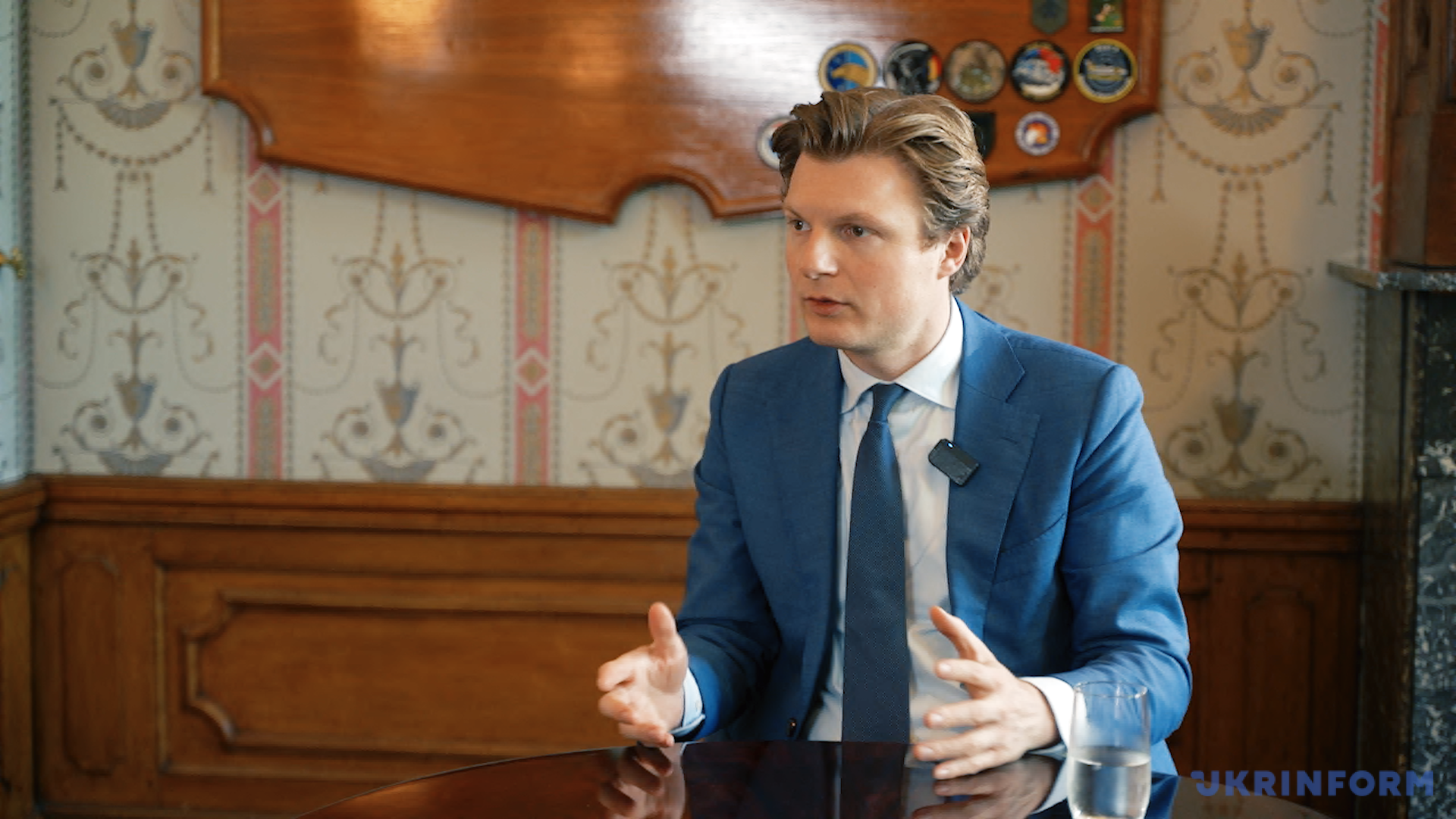
UKRAINE HAS THE MOST POWERFUL AND, IN MANY ASPECTS, THE MOST INNOVATIVE ARMY IN EUROPE
- Do you agree that the Ukrainian Army is the most experienced army in Europe, possessing unique expertise in conducting modern warfare and using new technologies, and that this experience can be very valuable for NATO?
- Of course. At this point, I believe it is the most powerful military in Europe. Ukraine has been fighting a large-scale war for over three years, innovating rapidly and doing so on a daily basis. The military has fully developed new methods of operation and applies them continuously.
This is, of course, different from other European militaries, which are mostly focused on training, conducting exercises, and participating in missions in some parts of the world — but not on such a large scale and not with the same pace of innovation.
On the other hand, we also see areas that are still developing. Take, for example, the Air Force: Ukraine still operates from a more Soviet background and is now transitioning to NATO standards. There are also parts of the military where this development still needs to take place.
Of course, we can help with that — and we are.
But overall, I believe that at this point, Ukraine has the largest, most powerful, and in some ways, the most innovative military in Europe.
- Is it true that you are in contact almost daily with your Ukrainian counterpart, Defense Minister Rustem Umerov?
- We do have regular contact in different ways, but not on a daily basis. That’s mostly because he is extremely busy — not only leading the Ministry of Defense, but also heading the negotiation team.
I have a great deal of respect and admiration for how he handles both roles. You know, if you're leading a military at war and, at the same time, part of a negotiation team operating at the highest global level — I think that’s truly remarkable. So that’s why I don’t disturb him on a daily basis. But if needed, we know how to reach each other very quickly.
- Last week, you announced a new €400 million support package for Ukraine in the area of maritime security, as well as the signing of an agreement with Ukrainian Defense Minister Rustem Umerov. Could you elaborate on this agreement and its strategic importance?
- So we want to invest quite a lot in the Ukrainian industry. For example, we invested in the Drone Line initiative, which is a big project consisting of four Ukrainian drone manufacturers producing drones needed at the frontline. We are signing contracts with these four Ukrainian companies to make these drones. But we want to do more with the Ukrainian industry. As the Netherlands, we invest directly in Ukrainian companies and entrepreneurs. You could call this a Dutch model, but what matters more is this way of cooperating. We signed an MoU to ensure that, in addition to the contracts we have already signed, we can work more effectively and efficiently in the future. This will enable us to invest faster in the Ukrainian industry. We are also exploring opportunities to have joint ventures in the Netherlands, so that some of the production could take place here. Because, of course, we see that manufacturing sites in Ukraine are being targeted by Russia. Mr. Umerov also said that Ukraine wants to reduce these vulnerabilities and ensure there are alternative production sites in other parts of Europe. So, we are not only looking to invest more inside Ukraine, but also considering whether part of the production can take place in the Netherlands, possibly through joint ventures between Ukrainian and Dutch companies.
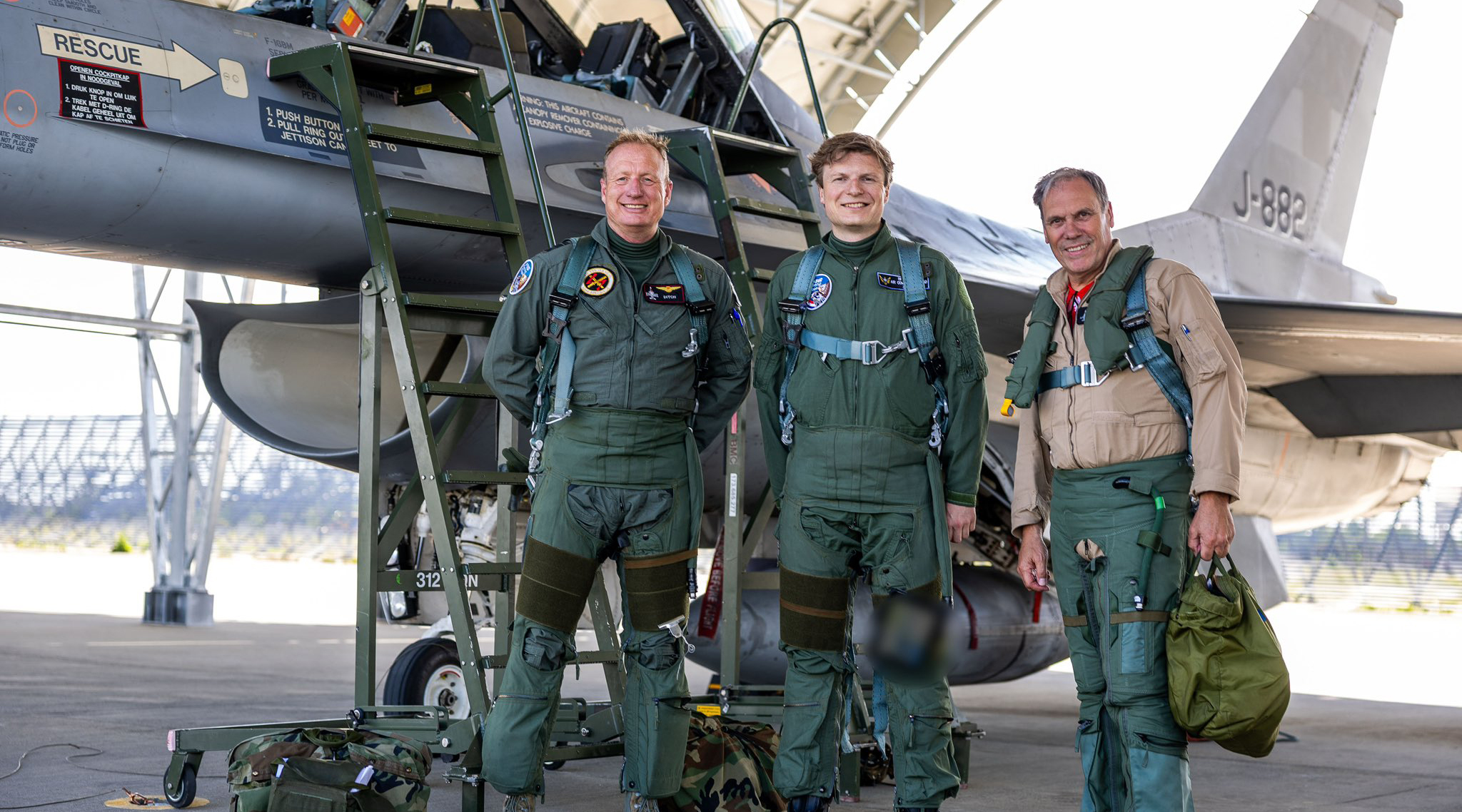
WE HAVE DELIVERED ALL 24 F-16s, AND NOW OUR NEW PRIORITY IS DRONES
- In December 2024, the Netherlands allocated €22 million for Ukraine’s cybersecurity resilience and air defense projects. How is cooperation developing in these areas?
- So of course, cybersecurity is very important because we see that Russia is attacking not only militarily but also digitally. So we are supporting Ukraine in this area as well, and we are working together on it. However, I don’t share many details about this because we want to avoid giving Russia too much information. It’s a continuous cat-and-mouse game, and if they know where we are supporting, that could already be valuable intelligence for them.
To be fully honest, I don’t know everything we do either. Of course, I am sometimes briefed by different people on this, but I don’t know all the operational details and technicalities.
But it is an important topic, of course, and we try to help in the best way we can.
- How do you assess the effectiveness of military aid to Ukraine from the EU? Is there potential for its growth? How promising is the expansion of cooperation formats through joint production or funding of innovative drones?
- So, I think we are supporting the military in a very broad way. I believe we have delivered almost every weapon system or type of equipment you can think of. If you look at our priorities, we started with helmets and Stinger missiles then Patriots and also elements of the Patriot systems. Then F-16s became the key priority. F-16s remain important because we have delivered all 24 fighter jets, but we also continue delivering ammunition, spare parts, training—everything that’s needed.
Currently, our new priority is drones, mostly the more sophisticated ones. So, not simple FPV drones, but more advanced and sophisticated drones. We also continue delivering air defense systems, armored vehicles, different types of ammunition, fuel—everything necessary.
In total, we deliver around 3 to 3.5 billion euros each year. We have committed to maintain this level of support through 2026. We have already pledged that money because we see that Ukraine needs more support right now. In fact, we have already spent 2 billion of the 3.5 billion euros allocated for this year, so we have accelerated our support.
Currently, our priorities are drones, air defense, everything related to the F-16s, and maritime security. Two weeks ago, we announced a large package of 400 million euros for maritime security, including various types of vessels and patrol boats. All of this is necessary for Ukraine to protect its shores and the Dnipro River. And, of course, we need to make sure Russia is not able to push through in the South.
- You already mentioned the F-16s. The Netherlands has completed the delivery of 24 F-16 fighter jets to Ukraine. We sincerely thank you for this! Could you share your personal experience with the F-16? What was it like to fly a fighter jet?
- I didn't fly myself, unfortunately; I was in the back seat. It was a great experience. Of course, it is very exciting to sit inside the F-16 and to experience how flexible it is. On the one hand, it has great speed, but you also feel a bit like a bird in the sky. We did a loop and performed various maneuvers. I was able to do this with one of our most experienced F-16 pilots, who is also very active with the Air Force Capability Coalition and our Ukraine task force. It was great to do this with him, and he showed me different types of maneuvers and some special tricks. So I got to fully experience what it's like to be in an F-16. The flight lasted about 45 to 50 minutes, and it was definitely an experience I will never forget.
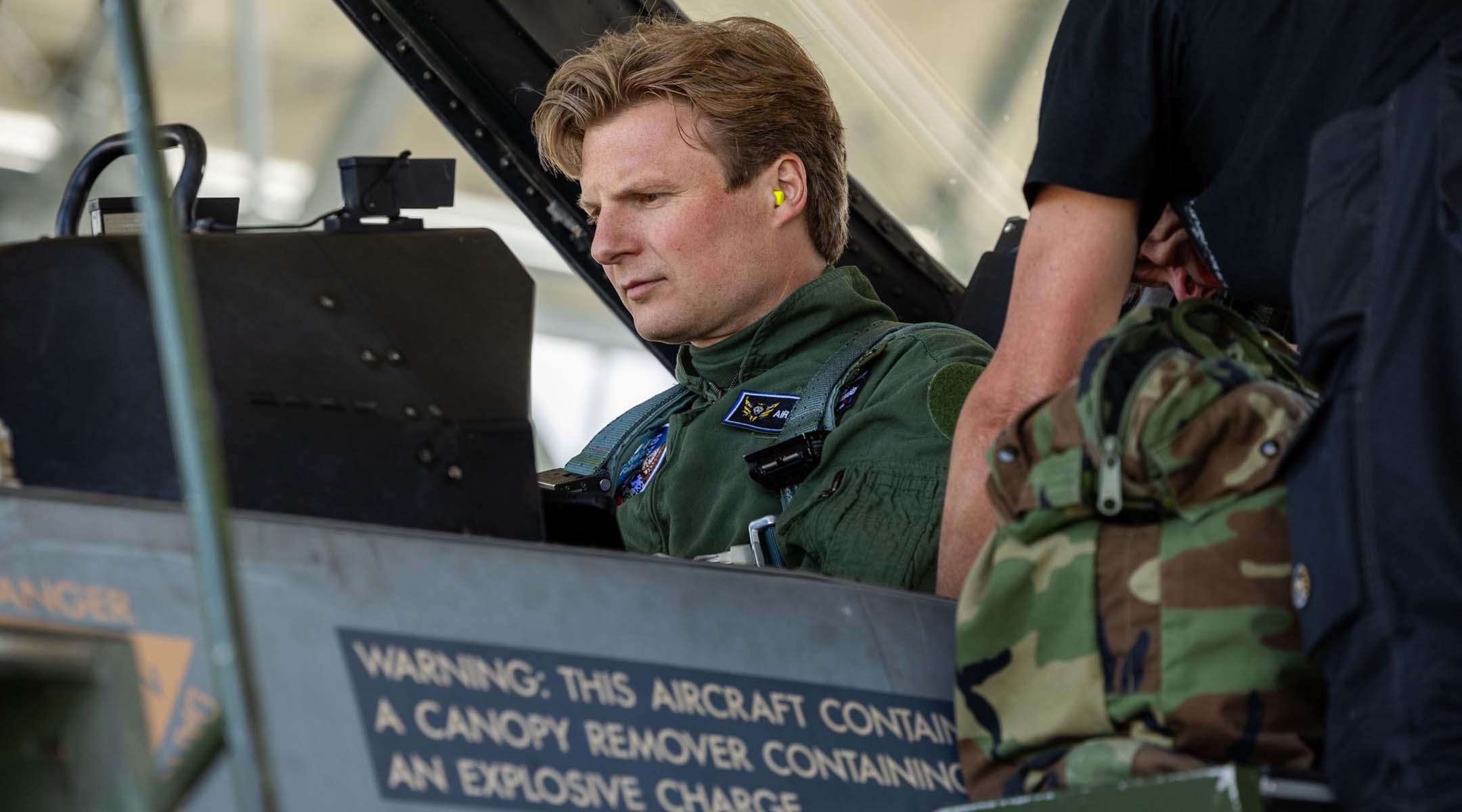
F-16S IN UKRAINE ARE USED FOR A GREAT AND IMPORTANT MISSION – SAVING LIVES
- What was it like to say goodbye to the F-16s, and what does it mean to you? You now have the F-35s — is there a chance that Ukraine might also have them one day?
- So it was a bit of a mixed feeling. I think that for many people here at the Dutch Ministry of Defense, the F-16 is, of course, something significant, as it is the most well-known fighter jet. Some of our pilots have been flying the F-16 for over 40 years, so it's something special. But on the other hand, people were very happy that we were able to give it to Ukraine. You know, that’s the best possible destiny we can imagine.
So I think, on the one hand, people felt a little bit sad, but they also understood that with the F-35—our next-generation fighter jet—we need to move forward, and we already have. But the fact that we were able to give the F-16s to Ukraine, and that we know they are being used in such a great and important way, staying in the skies to save lives, gave everyone a very positive and uplifting feeling.
There was also a lot of appreciation for the cooperation with Ukraine. Many of our pilots know how long it takes to train and master the F-16. And now, Ukrainian pilots are doing in one year what our own pilots usually take several years to achieve. It's really remarkable how Ukraine’s pilots and technicians are able to adapt so quickly. So there's also a lot of appreciation and respect from our side for how Ukraine and Ukrainians are handling this.
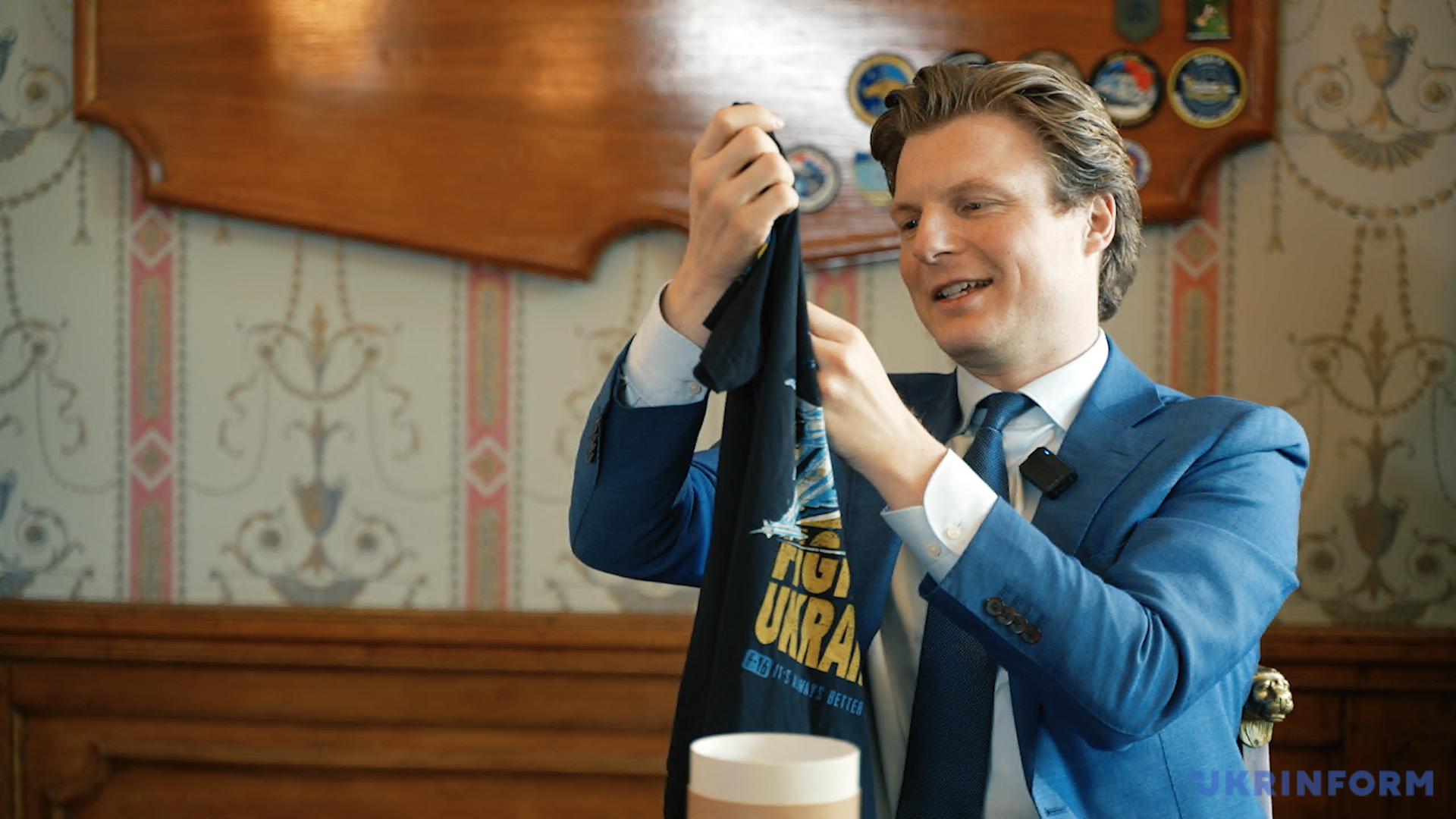
In gratitude for the F-16s, I also have a small gift from Ukraine to add to your collection. (The correspondent hands over a gift box – ed.)
- Oh, thank you. May I open it?
- Yes, of course. (Inside is a men's T-shirt with the inscription "F-16. FIGHT LIKE UKRAINIANS" – ed.)
- Oh, this is wonderful. I really like it. A very special gift. Thank you. And it seems to be my size or at least a good motivation for me to lose a bit of weight.
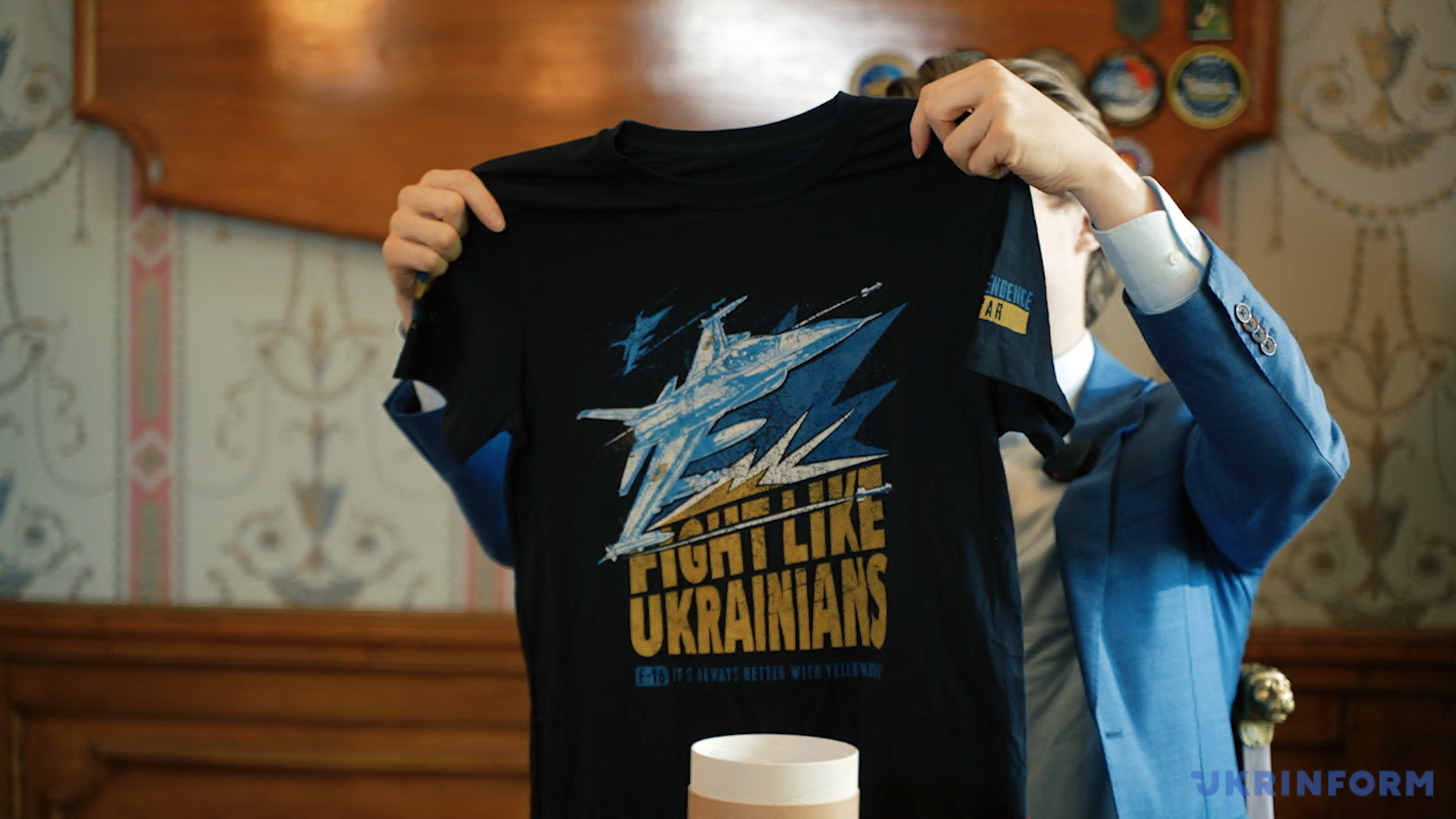
- So, the F-35s — will they protect the Ukrainian skies one day?
- I think so, and I hope so. It takes quite a long time because it is definitely a new generation of fighter jets. So you need to make sure that your pilots are fully trained. You need to ensure that you understand all the procedures and everything that comes with it.
Also, you need to change your infrastructure, because the airbase required for an F-35 is different from that of an F-16. So it's not easy. But, you know, we’ve been able to do it. Many other countries have done it or are in the process of doing it.
So I'm 100% confident that Ukraine can do this in the future as well. But I think this first step — the F-16 — is already a major milestone. And it’s great if Ukraine is able to make that transition successfully.
RUSSIA CONTINUES TO BUILD UP ITS MILITARY CAPACITY IN PREPARATION FOR A POTENTIAL CONFLICT BEYOND UKRAINE'S BORDERS
- Russia has achieved limited tactical gains on the battlefield, but strategically, it remains stuck in Ukraine and has not achieved any breakthroughs since 2022. Despite this, how do you assess the ongoing threat from Russia to European stability?
- I think Russia, even though they are only gaining limited successes, as you say, poses a very big threat. We see that they are continuously further building up their military capabilities: producing more weapon systems and recruiting more soldiers. What we also see is that they are not only doing this to continue their aggression in Ukraine, but are also already preparing for a potential conflict beyond Ukraine. We also see that they are replenishing their inventory levels in other parts of Russia as well. So I think that is very concerning. We also know that Putin's imperialistic ambitions go beyond Ukraine and that he wants to reinstate the influence of the Soviet empire, for example, in the Baltic states and other regions. So I think this is a very serious concern, and that is why I fully support the NATO military plans that are made not only to defend NATO territory but also to deter Russia.
- In your opinion, is a sustainable ceasefire possible in the near future? What conditions would be required for that to happen?
- I hope that it will turn out to be possible. I think it’s very good that Ukraine has shown willingness to talk, negotiate, and have a ceasefire of 30 days or longer in the short term. However, we do see, of course, a lack of willingness on the Russian side. What we need to do — and this is something I often tell my colleagues — is try to change the underlying dynamic. As long as Putin believes that prolonging the war will put him in a better position, I think he will continue the fight and will not be inclined to compromise. He doesn’t care that he is losing 1,000 or even more soldiers a day, which of course is ridiculous considering the territory he is gaining. But as long as he thinks fighting is in his interest, and that time is on his side — that he will be in a better position in a month or a year if he continues fighting — then I’m afraid he will keep going. So we need to put more pressure on Russia to weaken their position, and keep supporting Ukraine to strengthen theirs. If that happens, then I think Putin will be forced to sit at the table and compromise.
- What is your view on Ukraine’s “Spiderweb” operation? Should there be more such operations to strengthen Ukraine’s strategic position?
- I think we were all very impressed by the special operation. I also mentioned that Ukraine keeps surprising us in a positive way. Of course, it’s not the first time Ukraine has been able to do something we thought was unimaginable. I remember the sinking of the cruiser "Moskva" in 2022 very well, as well as the counteroffensive in 2023, and now this operation. I think it shows that Ukraine is really capable of doing things we cannot even imagine. This only encourages me even more to keep supporting Ukraine because I know that every piece of equipment, every type of ammunition, every bit of information, or whatever we provide to Ukraine is used very effectively and for a good purpose. And I think this should encourage my colleagues to deliver even more as well.
Iryna Drabok, The Hague
Photos provided by the author and Ruben Brekelmans
